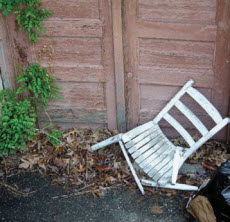
*© Stephen B Heard, October 13, 2015. Reprinted with permission from Scientist Sees Squirrel (scientistseessquirrel.wordpress. com/). Stephen B Heard is professor of biology at the University of New Brunswick, in Fredericton, NB, Canada. He’s an evolutionary ecologist whose research interests revolve around interactions between insects and plants. Among other things, his lab studies host-associated genetic differentiation in plant-feeding insects, the population and community ecology of insects in forests, and the ecological forces controlling speciation rates. Follow him on Twitter: @StephenBHeard.
No, it isn’t, of course, but you’d sure think it is if you chat around the water cooler, pay attention to Twitter, or read blogs or Nature News. Publishing is broken. Tenure is broken. Peer review is broken. Academia is broken. Reassuringly (I guess), at FiveThirtyEight Christie Aschwanden recently posted a long essay arguing that science isn’t broken.1 It’s an excellent and persuasive read, but the fact that it exists at all is pretty good evidence that a lot of people think science is broken. It’s not just science, either: Google will return lots of hits for “politics is broken”, “health care is broken”, “the music industry is broken”, and many more. What a broken world, we tell each other, we’re living in!

com, CC BY-NC-SA 2.0.
Why is our discourse so rich in “X is broken”? I think there are two simple reasons, and they’re the same two reasons that bad news dominates the lay media (Nick Kristof makes this point well2). First, it’s easy to write a piece about how horrible something is. Examples of fraudulent papers, deadwood faculty members, and delayed peer reviews are easy to find, because we all love to pass them on when we find them, and moral outrage is easy to muster (after all, these things are indeed bad when they occur). Second, we love to hear or read stories about how horrible something is. Speaking for myself, anyway, a story about a fraudulent paper, a deadwood faculty member, or a delayed peer review leaves me feeling good about myself that I don’t do those things, and deliciously scandalized that other people do. That’s why blog posts (for instance) that decry an injustice or point out a systems failure rack up thousands of page views. It just isn’t as much fun to write, or read, about how the way we do things works pretty well, most of the time. Most papers aren’t fraudulent, most tenured faculty work hard, most peer reviews are on time3 and helpful.4 But what’s the fun in that?
Now, I’m not a complete Pollyanna. Science has had enormous success, and it’s great fun5 to do6 —but plenty of things about it can still be improved. Science isn’t broken, but parts of it are dented, chipped, or only roughly hewn, and we shouldn’t ignore that. We are far from finished diversifying the community of scientists and removing biases (conscious and unconscious) that affect how we see each other. There are legitimate debates around whether or not we’re overproducing and underpaying graduate students and postdocs. There are problems with our funding models for science, especially for so-called “basic” or “curiosity-driven” research. These issues, and more, deserve our serious attention.
So I’m not suggesting that you shouldn’t read the next pronouncement that “Thing X is Broken”. It’s always useful to have a problem (real or perceived) on your radar. But when you do read that next pronouncement, ask yourself three questions. First, is this really a problem at all? Second, if so, how big a problem is it? And third, and most important, do we really need to toss out X and start over, or is there something small I can do to help solve the problem? Perhaps you can take on an extra peer review, or submit your next one more promptly. Perhaps you can mentor an extra underrepresented student. Perhaps you can give a radio interview about the importance of research funding. Despairing that things are “broken” makes us unlikely to take these actions—but I think it’s precisely such incremental but important steps, when they’re taken by each of us and by all of us, that pull science forward.
- fivethirtyeight.com/features/science-isnt-broken/
- www.nytimes.com/2015/10/01/opinion/nicholaskristof-the-most-important-thing-and-its-almost-asecret.html?action=click&pgtype=Homepage&mod ule=opinion-c-col-left-region®ion=opinion-c-colleftregion&WT.nav=opinion-c-col-left-region&_r=0
- scientistseessquirrel.wordpress.com/2015/08/31/howlong-should-peer-review-take/
- scientistseessquirrel.wordpress.com/2015/05/05/arereviewers-crazy-or-are-they-saints/
- scientistseessquirrel.wordpress.com/2015/04/09/onexpressing-our-joy-as-scientists/
- scientistseessquirrel.wordpress.com/2015/03/18/ihave-the-best-job-on-the-entire-planet/
Commentary on “Is Everything Broken?”(by Stephen B Heard)
Tracey A DePellegrin
Starting in this issue, Science Editor will provide you with relevant reads and ICYMIs (In Case You Missed It) around topics scientists are talking about. The landscape includes funding, peer review, public access, reproducibility, data sharing, visibility, the sociology of science, and more. To that end, Science Editor will cover blog posts, articles, white papers, and other tidbits you may want to peruse. And because many if not most of you are already tuned in to what’s going on with your scientist constituents, please email me with suggestions for material to cover (tracey.depellegrin@thegsajournals.org).
Why discuss these issues in a forum for scholarly publishing? Because we owe it to our constituents to understand their most pressing concerns that overlap with ours. Having a more full view will not only help us to serve our authors, editors, reviewers, boards, customers, and others but will ensure that we don’t live in an echo chamber.
In this issue, we reprint the post “Is Everything Broken?” by Stephen B Heard, originally published in October 2015 on his blog Scientist Sees Squirrel. Heard is an evolutionary ecologist and entomologist at the University of New Brunswick. He’s also the author of The Scientist’s Guide to Writing, a book to be published in April 2016 by Princeton University Press. In his blog post, Heard tackles the seldom-discussed topic: the echo chamber of doom and its discontents. He wonders aloud and asks readers to challenge themselves, too, whether [simply insert issue of choice here!] is truly as beyond repair as what we’re hearing—particularly via social media or from a handful of sources (albeit loud ones)? He urges us to take a rational approach to evaluating information presented in the context of emotional drama.
Without explicitly saying so, Heard warns against a tactical use of language to invent a crisis—or at least to escalate problems or simmering complaints into crises—often using strategies of a few anecdotes, hyperbole, some (select) facts, and lots (and lots) of social media and blog posts. As scientific editors and communicators, we avoid using words to tilt reality. But as readers, we know all too well the frequency of such strategies. It’s worthwhile to consider what our role is in encouraging discussion rather than panic.
To that end, “the sky is falling” mantra aside, even if things really are a bit bent (or even broken), Heard asks, isn’t there something you (with the emphasis on you) can actually do besides commiserate or complain?
I urge you to read “Is Everything Broken?” and check out the rest of Heard’s writing at Scientist Sees Squirrel (scientistseessquirrel.wordpress.com).
